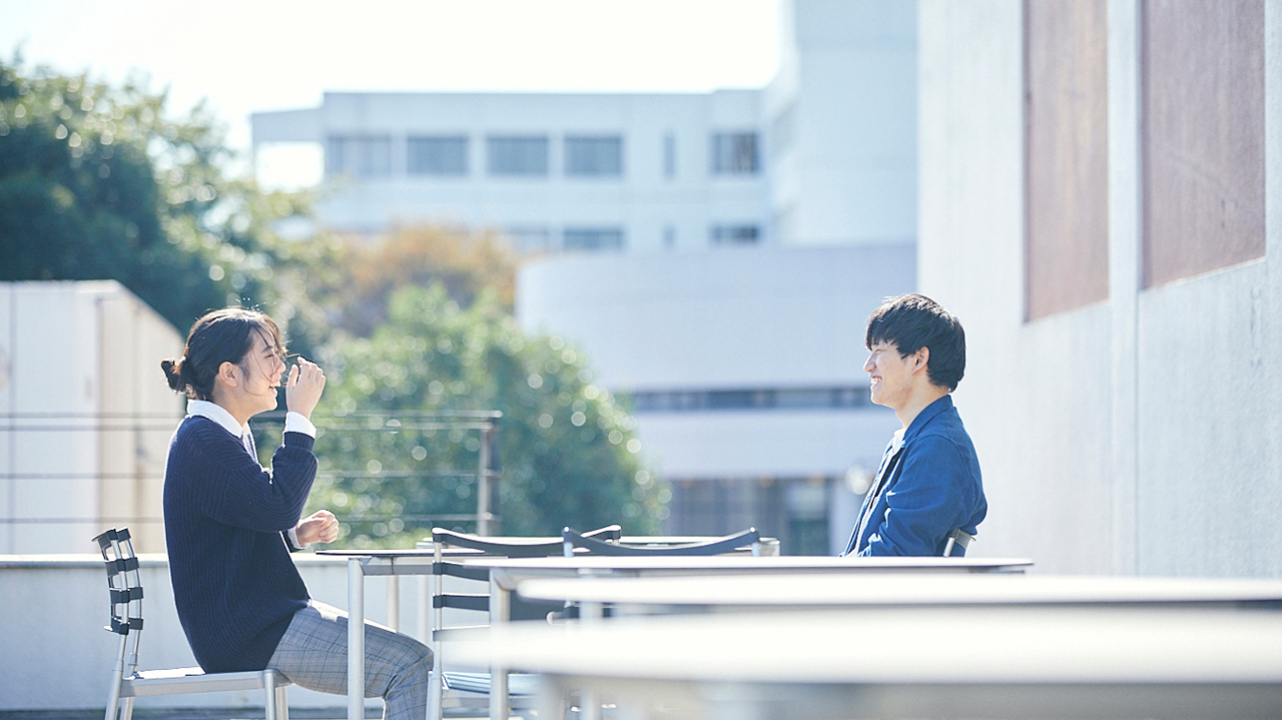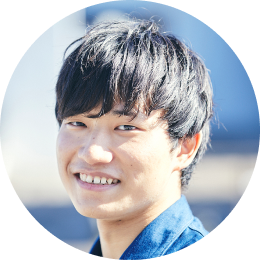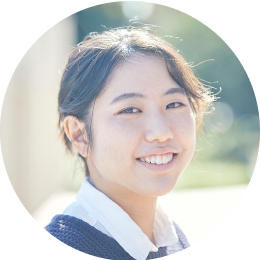Keeping the legacy of their predecessors alive, students in the Junko Association will continue to support children in developing countries
Junko Takahashi passed away in an accident in 1993, when she was a third-year student, but from her experiences in Vietnam she hoped to devote her life to creating environments where children in developing countries can receive a good education. Carrying on her legacy is the Junko Association (JA), a nonprofit student organization. With 57 active students, they have provided educational support in Southeast Asia, such as establishing the Junko School in Vietnam and building a library in Myanmar. In recognition of their achievements, they received a Minister of Foreign Affairs award in 2020. We spoke with students from JA, which celebrated its 26th anniversary this year, to discuss their activities.


Nozomi Kitajima
Third-year student, Department of International Studies, Faculty of International Studies
Junko Association Vice-president
He became interested in foreign countries after traveling to Thailand, and chose his major to learn about international law and refugees. He is enrolled in Sun Zhan-Kun’s seminar. His interests include reading, playing the violin, listening to music, and basketball. He played violin in the University orchestra as a first-year student.

Natsumi Akane
Second-year student, Department of International Studies, Faculty of International Studies
Project Leader, Junko Association Myanmar Project
Ms. Akane entered Meiji Gakuin University because she was attracted to various international fields. She is enrolled in the Megumi Hirayama seminar. She wanted to volunteer at Meiji Gakuin since even before starting school here. Her hobbies include basketball, and she played on basketball teams until high school.
Joining the Junko Association from an interest in volunteering and Southeast Asia

- Akane
I joined JA after an upper-level student approached me at an online event for freshman in the Faculty of International Studies. I knew I wanted to do volunteer work in college, and it looked like fun when I visited.

- Kitajima
When I came across JA, I already had an interest in the culture and people of Southeast Asia, and knew I wanted to see it with my own eyes. I joined JA because I thought it was a solid organization that was not only a student group but also a nonprofit organization, and I thought I would be able to experience a lot through it. As it turns out, I was right.

The “two axes” of activities

- Akane
As a leader of the Myanmar Project, I am now mainly involved in emergency support for COVID-19 management (infection control). We are currently interacting with four local schools (a monastery school, two orphanages, and an integrated school that teaches all grades from kindergarten to high school). Before the COVID-19 pandemic, we built a library, conducted a library project to share our management expertise, and engaged in a scholarship project that supports motivated students with scholarships. We are also managing a pen-pal project between high school students in Kanagawa Prefecture and Myanmar, and we plan to conduct a project called “Let’s make a pamphlet to let people know about Myanmar” in the future. These activities are built along two axes. One is tearing down people’s stereotypes regarding volunteerism, particularly the idea that you can’t engage in international volunteerism while remaining in your own country. The second is that we want people to learn more about Myanmar. For that reason, we’re having high school students there propose their own pamphlets.

- Kitajima
I am currently serving as JA Vice-president, and I was the Myanmar Project Leader before Natsumi. We third-year students were the last cohort able to actually work in Myanmar. In my first year, I was able to go there to work on the scholarship project.

- Akane
I’m new to being a leader, so I still have a lot to learn about communicating with people in Myanmar. Sometimes I wouldn’t get a response to my messages, so at times like that I would ask Nozomi and other upper-level students for help.

- Kitajima
Some JA board members are former students. In addition to board members, we also have people there on local assignments and as Japanese language school managers, and they have been extremely helpful, especially during the COVID-19 pandemic. The country is experiencing some military issues right now, so we have about twenty people, including Myanmar citizens, who are keeping us updated regarding how things are going in their towns.

A focus on emergency support (infection control) in Myanmar

- Kitajima
For the first time, we currently have no prospects of being able to carry out activities in the country, so I haven’t been to Myanmar since I was there in January and February 2020. As the number of infected people in Myanmar started to increase in around May through June, we decided to give top priority to sanitation support. Now everyone (eight first-year students, four second-year students, and five third-year students) is involved in the Myanmar Project, and even some retired fourth-year students come from time to time.

- Akane
We support both the “hard” and “soft” aspects of sanitation. Hard aspects include providing things like soap, soap nets, disinfectant spray, and masks, and we have local support that helps us get those items where they are needed. Soft aspects include informational posters, of which we have created ten varieties. To create these we referred to Ministry of Health, Labour and Welfare websites and other sources to gather information regarding how to use hygiene products, the importance of infection control, and how the virus spreads, and we created posters that can be understood at a glance.

- Kitajima
We created posters that show not only infection control measures, but also how infections occur.

- Akane
The posters needed to be written in Burmese, so Sato Natsuki, a fourth-year International Studies student who has studied in Myanmar, translated it for us.

- Kitajima
There is a lot of traffic in and out of the orphanage, but thanks in part to our posters, they currently have zero infections.

- Akane
We have photos from there showing people looking at our posters with curiosity, which is what made me happiest. We also proposed places where the posters should be displayed, such as near sinks. I just hope the coup d'état and other social situations are resolved, so that more people in the area will be able to see them. We plan to have online discussions with local residents to see what more can be done.

- Kitajima
We are thinking about putting more emphasis on understanding hygiene and promoting education, because sending supplies tends to result in only superficial support. JA mainly provides educational support, so we feel that soft-aspect support is our strength.

What we think about JA in its 26th year

- Kitajima
There are still many issues we need to address, but it is very important that students and alumni carry on Junko Takahashi’s legacy every year. That’s been particularly true since we received a Minister of Foreign Affairs award. We are grateful to our local collaborators and the public for their support.

- Akane
I was struck by the fact that when visiting Junko’s grave, her father once asked himself whether there wasn’t more he could have done for her. I think it’s amazing that our group has been able to maintain its activities for 25 years as a result of our members continuing to think about what they can do for others, making us an organization that has an impact on students even today. I feel that we must not allow our activities to stop, and I want to remain active myself.

- Kitajima
This summer, a Vietnamese person wrote a poem expressing her gratitude and appreciation for Junko’s philosophy, printed it on a panel, and sent it to us via the Ministry of Foreign Affairs. She was not a Junko School graduate, just an ordinary person who learned about Junko School activities and sympathized with them. I was surprised to see how widely the Junko School had become known.

What JA will aim at in the future

- Kitajima
JA is also involved in business projects involving the production and sale of local crafts in Vietnam, Myanmar, and other countries. Events where we sell our products were cancelled and some stores that sold them went out of business, so at the end of last year we started selling online. Since it is uncertain how things will work out in the future, I want to think over longer spans of time rather than one-time projects.

- Akane
While we are currently focusing on emergency relief, we also want to promote educational support for children and teachers who cannot go to schools or libraries due to the social situation where they live.

- Kitajima
JA’s goal is to eventually withdraw from the places where we are active. In other words, we want everything to be taken care of locally, making our support no longer needed. I would like to continue to support regional education with this goal in mind. I also want to keep Junko’s legacy alive for many years to come. For example, I may become a board member after I graduate. Maybe I’ll even have my own children enroll in Meiji Gakuin and join JA. I hope Junko’s legacy will be carried on for at least that long.

- Akane
That would be great!

- Kitajima
I know that’s a long way off, but it’s been such a great experience that I want my children to be a part of it.

- Akane
Nozomi obviously cares about people and works hard for them, for which I am very grateful. The feelings of many seniors like him combine with how Junko felt, making those feelings grow bigger and bigger. It’s fun to feel that while we’re working, and I hope JA will remain a place where its members can enjoy such fun in the future.

- Kitajima
I received a lot of help from my seniors, so now that I’m an upper-class student myself, I feel it’s my responsibility to serve the next generation. We’ve been able to provide emergency support largely thanks to the curiosity of our project leader, Natsumi, and her ability to work closely with our members.

The encouragement of our seniors: “The COVID generation will be the strongest generation”

- Akane
There were two phrases that particularly impressed me during my activities. One was “don’t feel sorry,” meaning the people we’re helping are living happy, fulfilling lives, so we aren’t helping them out of feelings of pity. The other was something that JA President Yuya Abe (third year, Department of English) told me: “The COVID generation will be the strongest generation.” There’s no point in saying something cannot be accomplished due to COVID-19. We’re always finding ways to overcome the pandemic, and there’s always something we can do. That idea gives me a lot of encouragement, and I’m impressed with how Yuya could just come up with things like that. He made me braver.
Applying what we’ve learned through JA in the future

- Akane
Before volunteering, I’d never experienced a situation where there are no right answers. JA is a place where I can grow and be active, thanks to the help of other members and the cooperation of our seniors. I hope I can continue to grow, while doing all I can for JA and Myanmar, which I love.

- Kitajima
I’ve spent three years thinking about JA every day, and it involved hard work like weekly meetings. It was all worth it, though, because I can see how it changed my thinking and helped me grow. I joined the group on a whim, but doing so allowed me to learn the significance of volunteerism and the joy and wonder of serving others. It has also led to my own self-improvement.

- Akane
From taking teaching classes, educational activities through JA, and teaching at prep schools, I feel that education is the basis for solving all problems. If possible, I hope to gain more experience overseas and to work in a job that allows me to be involved with people.

- Kitajima
I too have been influenced by my activities at JA when I think about my future. I am thinking about seeking employment related to infrastructure, development, or construction, but wherever I end up, I want to work in an environment where I can contribute to society and to people.
